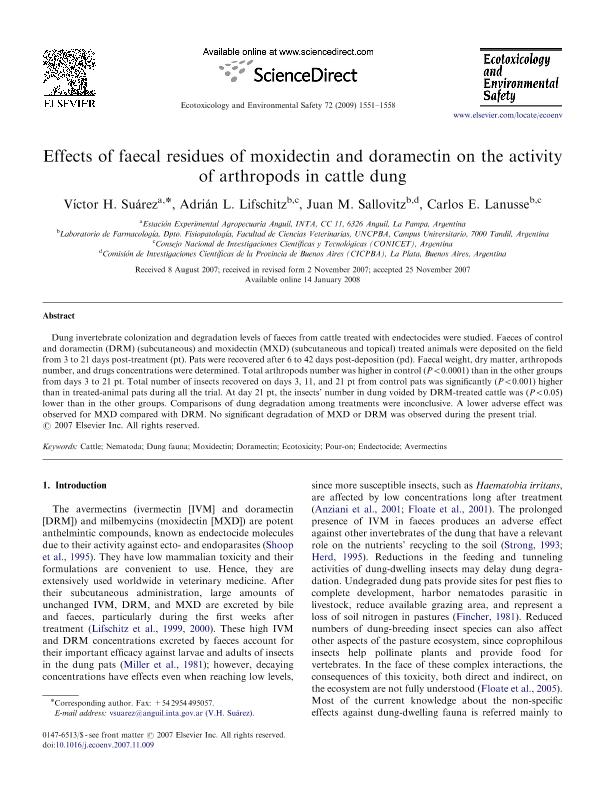Mostrar el registro sencillo del ítem
dc.contributor.author
Suarez, Víctor Humberto

dc.contributor.author
Lifschitz, Adrian Luis

dc.contributor.author
Sallovitz, Juan Manuel

dc.contributor.author
Lanusse, Carlos Edmundo

dc.date.available
2019-09-18T20:09:58Z
dc.date.issued
2009-07
dc.identifier.citation
Suarez, Víctor Humberto; Lifschitz, Adrian Luis; Sallovitz, Juan Manuel; Lanusse, Carlos Edmundo; Effects of faecal residues of moxidectin and doramectin on the activity of arthropods in cattle dung; Academic Press Inc Elsevier Science; Ecotoxicology and Environmental Safety; 72; 5; 7-2009; 1551-1558
dc.identifier.issn
0147-6513
dc.identifier.uri
http://hdl.handle.net/11336/83881
dc.description.abstract
Dung invertebrate colonization and degradation levels of faeces from cattle treated with endectocides were studied. Faeces of control and doramectin (DRM) (subcutaneous) and moxidectin (MXD) (subcutaneous and topical) treated animals were deposited on the field from 3 to 21 days post-treatment (pt). Pats were recovered after 6 to 42 days post-deposition (pd). Faecal weight, dry matter, arthropods number, and drugs concentrations were determined. Total arthropods number was higher in control (P<0.0001) than in the other groups from days 3 to 21 pt. Total number of insects recovered on days 3, 11, and 21 pt from control pats was significantly (P<0.001) higher than in treated-animal pats during all the trial. At day 21 pt, the insects' number in dung voided by DRM-treated cattle was (P<0.05) lower than in the other groups. Comparisons of dung degradation among treatments were inconclusive. A lower adverse effect was observed for MXD compared with DRM. No significant degradation of MXD or DRM was observed during the present trial.
dc.format
application/pdf
dc.language.iso
eng
dc.publisher
Academic Press Inc Elsevier Science

dc.rights
info:eu-repo/semantics/openAccess
dc.rights.uri
https://creativecommons.org/licenses/by-nc-nd/2.5/ar/
dc.subject
Avermectins
dc.subject
Cattle
dc.subject
Doramectin
dc.subject
Dung Fauna
dc.subject
Ecotoxicity
dc.subject
Endectocide
dc.subject
Moxidectin
dc.subject
Nematoda
dc.subject
Pour-On
dc.subject.classification
Ciencias Veterinarias

dc.subject.classification
Ciencias Veterinarias

dc.subject.classification
CIENCIAS AGRÍCOLAS

dc.title
Effects of faecal residues of moxidectin and doramectin on the activity of arthropods in cattle dung
dc.type
info:eu-repo/semantics/article
dc.type
info:ar-repo/semantics/artículo
dc.type
info:eu-repo/semantics/publishedVersion
dc.date.updated
2019-07-24T17:39:14Z
dc.journal.volume
72
dc.journal.number
5
dc.journal.pagination
1551-1558
dc.journal.pais
Países Bajos

dc.journal.ciudad
Amsterdam
dc.description.fil
Fil: Suarez, Víctor Humberto. Instituto Nacional de Tecnología Agropecuaria. Centro Regional La Pampa-San Luis. Estación Experimental Agropecuaria Anguil; Argentina
dc.description.fil
Fil: Lifschitz, Adrian Luis. Consejo Nacional de Investigaciones Científicas y Técnicas; Argentina. Universidad Nacional del Centro de la Provincia de Buenos Aires. Facultad de Ciencias Veterinarias. Departamento de Fisiopatología. Laboratorio de Farmacología; Argentina
dc.description.fil
Fil: Sallovitz, Juan Manuel. Provincia de Buenos Aires. Gobernación. Comisión de Investigaciones Científicas; Argentina. Universidad Nacional del Centro de la Provincia de Buenos Aires. Facultad de Ciencias Veterinarias. Departamento de Fisiopatología. Laboratorio de Farmacología; Argentina
dc.description.fil
Fil: Lanusse, Carlos Edmundo. Consejo Nacional de Investigaciones Científicas y Técnicas; Argentina. Universidad Nacional del Centro de la Provincia de Buenos Aires. Facultad de Ciencias Veterinarias. Departamento de Fisiopatología. Laboratorio de Farmacología; Argentina
dc.journal.title
Ecotoxicology and Environmental Safety

dc.relation.alternativeid
info:eu-repo/semantics/altIdentifier/url/https://www.sciencedirect.com/science/article/pii/S0147651307002989
dc.relation.alternativeid
info:eu-repo/semantics/altIdentifier/doi/https://doi.org/10.1016/j.ecoenv.2007.11.009
Archivos asociados
